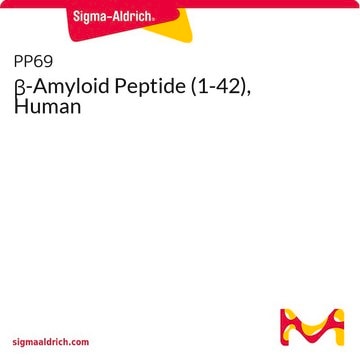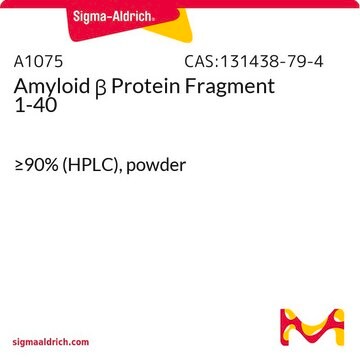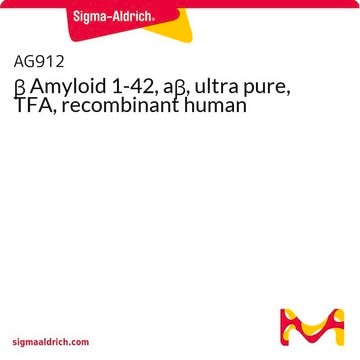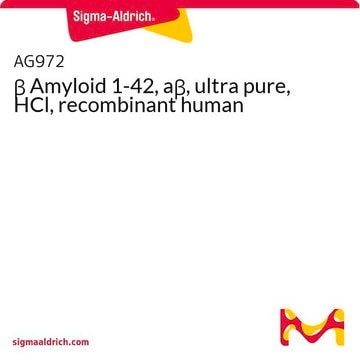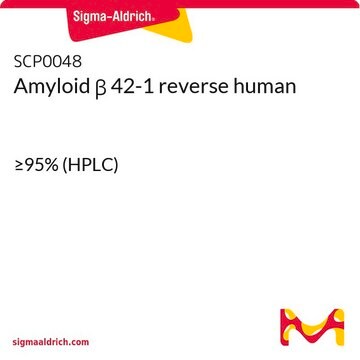AG968
β Amyloid 1-42, aβ, ultra pure, HFIP, recombinant human
Iniciar sesiónpara Ver la Fijación de precios por contrato y de la organización
About This Item
UNSPSC Code:
12352202
eCl@ss:
32160405
NACRES:
NA.41
Productos recomendados
biological source
human
Quality Level
assay
>97.0%
form
powder
manufacturer/tradename
Chemicon®
NCBI accession no.
UniProt accession no.
Gene Information
human ... APP(351)
General description
β Amyloid 1-42 is a derivative of integral membrane-bound amyloid precursor protein. It is the most important alloform of the Alzheimer′s peptide.
Application
β Amyloid 1-42, aβ, ultra-pure, HFIP, recombinant human has been used:
- to study its effect on the activity of mitochondrial BKCa (mitoBKCa) channels in human astrocytoma cells through patch-clamp technique
- to study its effect on alteration in protein levels of dystrophic neurites (DNs) forming proteins in mouse neuroblastoma cells
- to induce Alzheimer′s disease in a rat model for experimental studies
Biochem/physiol Actions
β Amyloid 1-42 causes neurotoxicity and is implicated in the pathogenesis of Alzheimer′s disease (AD). β Amyloid (βA) acts as a ligand for several receptors and other molecules involved in complex trafficking pathways in tissues and blood-brain barriers. βA along with amylin elevates cyclic adenosine monophosphate (cAMP) and Ca2+ in turn activates multiple signaling pathway mediators like mitogen-activated protein kinase (MAPK), protein kinase A/B, and cFOS. It acts as the main source of AD-associated neuroinflammation.
Legal Information
CHEMICON is a registered trademark of Merck KGaA, Darmstadt, Germany
Storage Class
13 - Non Combustible Solids
wgk_germany
WGK 1
flash_point_f
Not applicable
flash_point_c
Not applicable
Certificados de análisis (COA)
Busque Certificados de análisis (COA) introduciendo el número de lote del producto. Los números de lote se encuentran en la etiqueta del producto después de las palabras «Lot» o «Batch»
¿Ya tiene este producto?
Encuentre la documentación para los productos que ha comprado recientemente en la Biblioteca de documentos.
Los clientes también vieron
Annika Olsson et al.
Clinical chemistry, 51(2), 336-345 (2004-11-26)
To simultaneously study several biomarkers for Alzheimer disease (AD), we used the xMAP technology to develop and evaluate a multiparametric bead-based assay for quantification of beta-amyloid((1-42)) [Abeta((1-42))], total tau (T-TAU), and hyperphosphorylated tau [P-TAU((181P))] in cerebrospinal fluid (CSF). We compared
Stephanie J Soscia et al.
PloS one, 5(3), e9505-e9505 (2010-03-09)
The amyloid beta-protein (Abeta) is believed to be the key mediator of Alzheimer's disease (AD) pathology. Abeta is most often characterized as an incidental catabolic byproduct that lacks a normal physiological role. However, Abeta has been shown to be a
Mohabbat Ahmadi et al.
Avicenna journal of phytomedicine, 9(5), 465-473 (2019-09-14)
Zataria multiflora (ZM) is a plant with ethnopharmacological value which was recently tested to reduce symptoms of Alzheimer's disease (AD). The aim of the present study was to determine the effect of ZM essential oil on spatial cognitive and noncognitive
Ye Ji Lee et al.
Frontiers in molecular neuroscience, 16, 1150399-1150399 (2023-05-05)
Growth-associated protein 43 (GAP-43) is known as a neuronal plasticity protein because it is widely expressed at high levels in neuronal growth cones during axonal regeneration. GAP-43 expressed in mature adult neurons is functionally important for the neuronal communication of
Akiko Amano et al.
Journal of nanobiotechnology, 21(1), 36-36 (2023-02-02)
Although a large amount of evidence has revealed that amyloid β (Aβ), especially Aβ oligomers, protofibrils, and pyroglutamated Aβs, participate primarily in the pathophysiological processes of Alzheimer's disease, most clinical trials of anti-Aβ antibody therapy have never acquired successful efficacy
Nuestro equipo de científicos tiene experiencia en todas las áreas de investigación: Ciencias de la vida, Ciencia de los materiales, Síntesis química, Cromatografía, Analítica y muchas otras.
Póngase en contacto con el Servicio técnico
